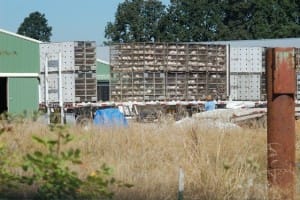Reveal News from The Center for Investigative Reporting
In December, Reveal will dedicate an hour to stories about food, looking at the complicated networks of labor, trade and regulation that carry meat, produce and other products to our tables.
We’ll upend your ideas about what kind of chicken is most susceptible to salmonella, unveil the secret history of pesticides that fuel the modern strawberry industry and look at a workers movement in Florida that’s transformed the tomato-picking business from the ground up.
 |
Source: Socially Responsible Agricultural Project |
Segment 1: The fowl business of salmonella
By Julia B. Chan
Click here and find the ‘listen’ button to hear the story.
In the U.S., even chicken that has passed all federal food safety requirements still can make people sick.
This proved true in 2013 after a massive salmonella outbreak linked to Foster Farms sickened hundreds of people in 29 states.
But even with reforms in the works, the U.S. government still allows companies to sell chicken that is infected with salmonella.
So how can you avoid it? Do you abstain from buying factory farm chickens and go for the local ones? How about raising chickens in your own backyard? Reporter Katharine Mieszkowski and producer Jillian Weinberger take us on a salmonella road trip and expose a massive gap in our food safety system.
Segment 2: From the battlefields to the strawberry fields
Click here and find the ‘listen’ button to hear the story.
Strawberries used to be a delicacy. The fruit is fragile, prone to disease and requires a very particular climate to grow.
But these days, you can buy strawberries almost anywhere at any time – including in Barrow, Alaska, a polar community with an average annual temperature of -9 degrees Fahrenheit.
So how did strawberries become so ubiquitous, and what are the consequences for farmworkers? The answer takes us on a meandering tour back to World War I, the Hawaiian pineapple fields of the 1930s and a savvy marketing campaign in the 1970s and ’80s.
Segment 3: When working conditions are ripe for change
Click here and find the ‘listen’ button to hear the story.
About one-third of the fresh tomatoes sold in the U.S. come from Florida. Mainly migrant workers from Mexico, Central America and the Caribbean hand-pick the tomatoes in or near the town of Immokalee, just north of the Everglades.
For decades, Florida tomato pickers endured some of the worst working conditions in America. Beatings, rape and sexual harassment were common problems. Often, there were no toilets, shade or clean drinking water. Work hours were unpredictable and wages were extremely low. There were even cases of slavery.
In 1993, the Coalition of Immokalee Workers began to organize. At first, it focused on ending slavery in the fields, then expanded its work to deal with wage theft and abuse. In 2001, it launched the Fair Food Program. The group brought about change by pressuring large retailers to use their market muscle to demand higher standards from suppliers.
Host Al Letson travels to the Sunshine State to tell us what happened after the tomato workers organized, pushed for reform and got the public to help.
Credits
Host: Al Letson
Executive Producer: Kevin Sullivan
Executive Editor: Susanne Reber
Head of Studio: Christa Scharfenberg
Lead Sound Designer and Engineer: Jim Briggs, with help from Joe Plourde
Reporters: Katharine Mieszkowski, Reveal
Lead Show Producer: Delaney Hall
Producers: Stan Alcorn, Julia B. Chan, Peter Haden, Delaney Hall, Jonathan Miller, Michael Montgomery, Neena Satija, Ike Sriskandarajah, Laura Starecheski, Amy Walters and Jillian Weinberger
Show Editor: Taki Telonidis
Digital Editor: Julia B. Chan
Editors: Andy Donohue and Amy Pyle, Reveal
Senior Management for CIR: Joaquin Alvarado and Robert J. Rosenthal
Senior Management for PRX: John Barth, Kerri Hoffman and Jake Shapiro
Support for Reveal is provided by the Reva and David Logan Foundation, the Ford Foundation, the John D. and Catherine T. MacArthur Foundation and Mary and Steven Swig.

